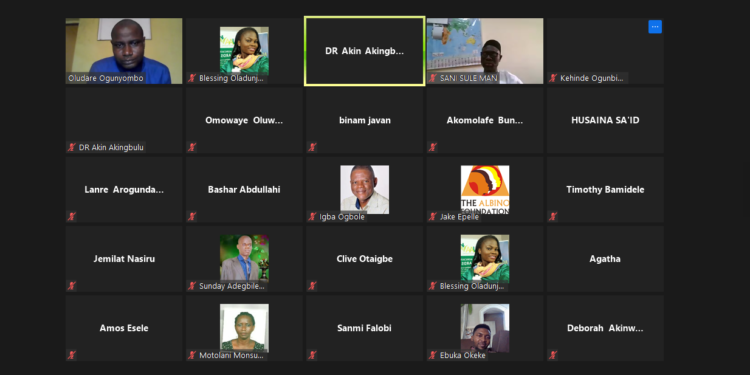Media experts, practitioners and academia have committed to be disability sensitive in their reportings, content production, publications and dissemination.
The commitment was made at a Webinar on ‘Focusing Journalism on Catalysing Disability Inclusive Electoral Process in Nigeria’ which was organised by the Institute for Media and Society (IMS), The Albino Foundation (TAF) and the International Press Centre (IPC), under the Support to Media Component of The European Union Support to Democratic Governance in Nigeria (EU-SDGN) Project.
The media practitioners made the commitment with an understanding that disability issues are cross cutting and needed to be adequately reported.
Barr. Danlami Basharu, Director, Anglo Nigerian Welfare Association for the Blind, explained that for the media to adequately report disability issues, they need to use the right language and not those that are derogatory.
“We need to use the right language and terminologies in describing people with disabilities, if we must report their issues appropriately,” he added.
While speaking on ‘Mainstreaming disability inclusivity into media agenda at elections’, Mr. Lanre Arogundade advised that, “the media should provide open forum for PWDs to participate in political and electorate debate;
“Increase the frequency and prominence given to disability during elections,” he explained.
Mr. Arogundade also buttressed that, “the voices of PWDs should as a matter of right be adequately projected during the electoral processes especially campaigns and voting” adding that media platforms should “provide the space and time for aspirants and candidates with disability to talk about their aspirations, manifestoes or programmes.”
On his part, Mr. Jake Epelle, Executive Director, The Albino Foundation urged the media to be proactive and responsive in reporting disability issues.
He explained that PWDs have the right to vote and be voted for, and as such the media should provide adequate coverage for them.
Speaking on disability-inclusion gaps in Nigeria’s electoral processes, Mr Epelle disclosed that there are “inadequate reportage of PWDs before, during and after the elections” adding that the electoral umpire has not been making adequate provisions for PWDs in the electoral process.
He also enjoined INEC to make available disability disaggregated data at polling units which would help to make adequate provision for PWDs based on their accessibility needs.
Earlier, Ganiyat Tijani –Adenle, a lecturer at the Mass Communication Department of the Lagos State University mentioned the important of training young journalists and writers on disability reporting so that when they join the industry, they can be disability-sensitive in their reporting.


Comments 1